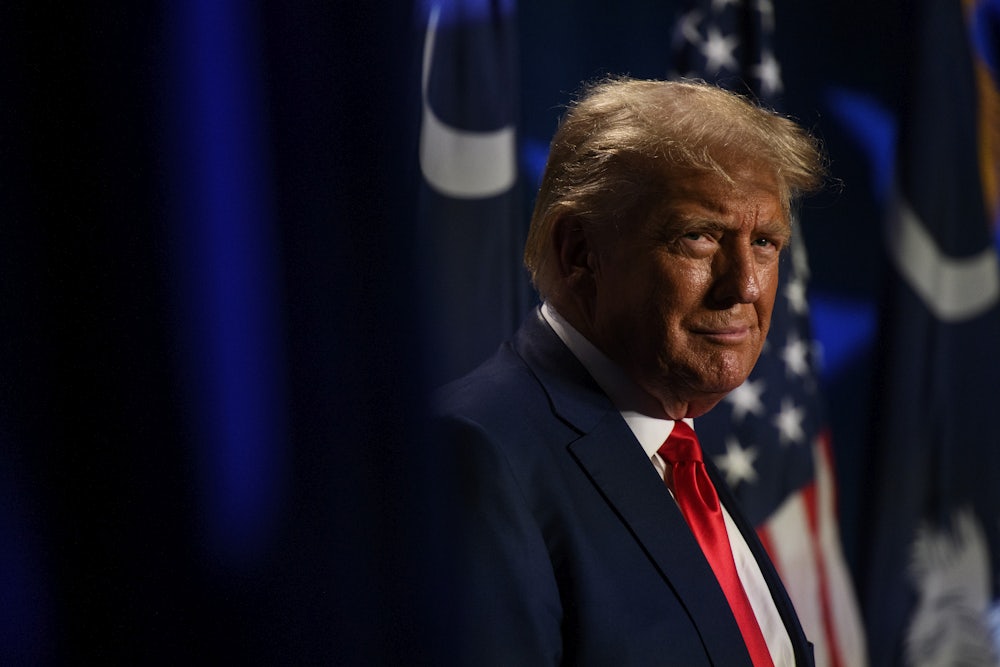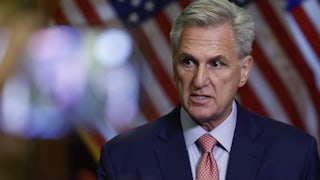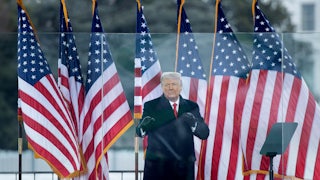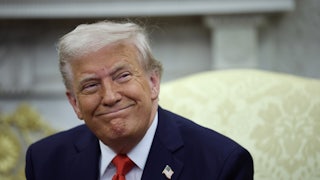The worst thing about President Donald Trump’s indictment for conspiring to overthrow the 2020 election through various fraudulent means is not, as The Wall Street Journal editorial board contends, that “it makes any future election challenges, however valid, legally vulnerable to a partisan prosecutor.” It’s not even that Trump used the previous two indictments to raise money for his 2024 presidential campaign (albeit with diminishing returns). No, the worst thing about Trump’s latest indictment is that it’s occasioning more public discussion about the workings of Donald Trump’s mind.
Let me stipulate at the outset that I’m very much in favor of this indictment. Reading through it, I feel that a jury will probably convict, given the robustness of the evidence. That’s a layperson’s view, because I’m not a lawyer. But if you weren’t aware back in late 2020 and early 2021 that Trump was using lies and threats to pressure state officials to reverse electoral counts, both directly and through a network of like-minded hacks and dimwits, then I have some Taylor Swift tickets I’d like to sell you.
What I can’t bear about this indictment is that it requires me to ponder what it is the former president thinks whenever he says something sociopathic, as he does on a regular basis. As I made clear more than a year ago (“I Don’t Give a Rat’s Ass About Trump’s ‘State of Mind’”), I find cogitating about Donald Trump’s mens rea (i.e., consciousness of guilt) about as much fun as going to the dentist for a root canal procedure.
Trump’s behavior is so glaringly repulsive in so many ways—this is a person, remember, who half-bragged in his 1987 memoir The Art of the Deal that he gave his second-grade teacher a black eye “because I didn’t think he knew anything about music”—that normal people struggle to understand it. What are we to make of a man who talks appreciatively about his own daughter’s breasts, backside, and (per White House chief of staff John Kelly via Miles Taylor, his former homeland security aide) “what it would be like to have sex with her,” to the point that Kelly has to remind the guy he’s talking about his flesh and blood? It wasn’t even the first time. “Can I say this?” Howard Stern said to Trump—on air—about Ivanka in 2004. “A piece of ass.” “Yeah,” the proud papa agreed.
A natural impulse for any ordinary human being, when confronted with such behavior, is to ignore it. Michael Kranish and Marc Fisher reported in their 2016 book, Trump Revealed, that Trump’s elementary school friends didn’t remember young Donald giving his teacher a shiner, and that the schoolteacher in question, one Charles Walker, never mentioned it. So maybe it never happened. If it didn’t, though, we have to puzzle why Trump invented it and why he thought it would make for an endearing childhood anecdote. “I’m not proud of that,” Trump wrote, “but it’s clear evidence that even early on I had a tendency to stand up and make my positions known in a very forceful way.” By now we’re well familiar with this Trumpy rhetorical device: Disavow, then affirm. Trump is saying he is proud of socking his teacher in the eye.
Did it happen? My best guess, applying the Occam’s razor principle, is yes, but that Trump was so busy misbehaving in so many other ghastly ways that the episode didn’t particularly stand out. “When that kid was 10,” Walker said, shortly before he died in 2015 (again, per Kranish and Fisher), “even then he was a little shit.”
Trump’s lawyer John F. Lauro, not the brightest bulb in the box, drew much ridicule this past weekend when he said on the Sunday news shows that when Trump told Vice President Mike Pence to toss out legitimate electoral ballots and substitute Trump electors, “he asked him in an aspirational way,” and that likewise when Trump told Georgia Secretary of State Brad Raffensperger to “find 11,780 votes,” that too “was an aspirational ask.” Lauro was trying, ham-handedly, to appeal to TV viewers’ sense that normal people don’t talk like that. And it’s true, they don’t. But not even Trump’s allies would suggest Trump is a normal person.
In effect, Lauro was saying that assertions that would be judged criminal coming from anyone else were just colorful hyperbole when they came out of Trump’s mouth. That’s ridiculous on its face. But it isn’t so different from what some of Trump’s critics seem to believe. David Von Drehle, writing in The Washington Post last week, conceded that the new indictment described “offenses that Trump commits routinely in the course of being his awful self, a walking almanac of vile character, shamelessly on florid display.” Yet Von Drehle expressed “serious doubts” that a jury could be persuaded that “aggravated Trumpiness is a felony.” How the familiarity of Trump’s well-documented misbehavior absolves it Von Drehle didn’t explain.
Well, he sort of explained it, in a spasm of what conservatives used to mock as liberal blame-America-firstism. Holding Trump accountable under the law, Von Drehle wrote, “might do less to bring Trump to justice than to make his critics feel better about ourselves.” David Brooks, a conservative anti-Trumper, sounded the same note in The New York Times under the headline “What If We’re the Bad Guys Here?” In Brooks’s scheme, Trump’s criminality was cosmic payback for the arrogance and snobbery of the meritocratic elite. Think of the former president as a sort of Jesus Christ in reverse. Donald Trump thrived for our sins.
Granted, there’s plenty in the American meritocracy to criticize; I took a stab at it two decades ago here. Further, I don’t disagree that Trump came to power partly on the strength of working-class resentment against the ruling meritocratic elite. But get a grip. The grand jury’s indictment is an indictment against Donald Trump, not the Phi Beta Kappa Society or the Council on Foreign Relations.
The most egregiously avoidant commentary on the Trump indictment was a New York Times guest essay by Michael Wolff, the author of three books about Trump’s presidency. “The president has a certain way of speaking,” Wolff quoted Trump’s White House chief of staff, Mark Meadows, telling him. “And what he means—well, the sum can be greater or less than the whole.” It’s hardly surprising that Meadows would furnish such a slippery rationalization; Meadows is a uniquely slippery character—so slippery, in fact, the there’s speculation he was excluded from the indictment in exchange for supplying evidence.
But Wolff bought in to this ridiculous notion too. “The chaos he creates is his crime,” Woff wrote, but there’s
no statute against upsetting the dependable order. Breaking the rules—often seemingly to no further purpose than just to break the rules as if he were a supreme nihilist or simply an obstreperous child—is not much of a grand criminal enterprise.… Prosecutors will soon run up against the epistemological challenges of explaining and convicting a man whose behavior defies and undermines the structures and logic of civic life.
Just imagine how this defense would play when recited to a random group on Cell Block A. Of course there are statutes, often quite serious ones, against upsetting the dependable order in certain ways. Your First Amendment rights don’t permit you to conspire to subvert the tallying of ballots any more than they permit you to point a gun and say, “Stick ’em up.” And anyway, subverting an election is hardly the act of an obstreperous child. Trump can be very goal-oriented when he wants to be, whether it’s buying the Taj Mahal casino or trying to bully a state official into manufacturing 11,870 votes. Pretty much by definition, anybody functional enough to get himself elected president is functional enough to be held legally accountable for his words.
Why does Trump say the things that he does? I don’t know. Neither does anybody else. What I would suggest is that we stop asking this question. It’s well documented that Trump said and did things that would get anybody else convicted in a court of law. His reputation as a crude liar and manipulator does not exonerate him. It’s merely more evidence that he’s the sort of person who never should have been elected president in the first place and who, once in office, was a good bet to commit a crime. That Trump fulfilled that expectation should not be reckoned a point in his favor.






